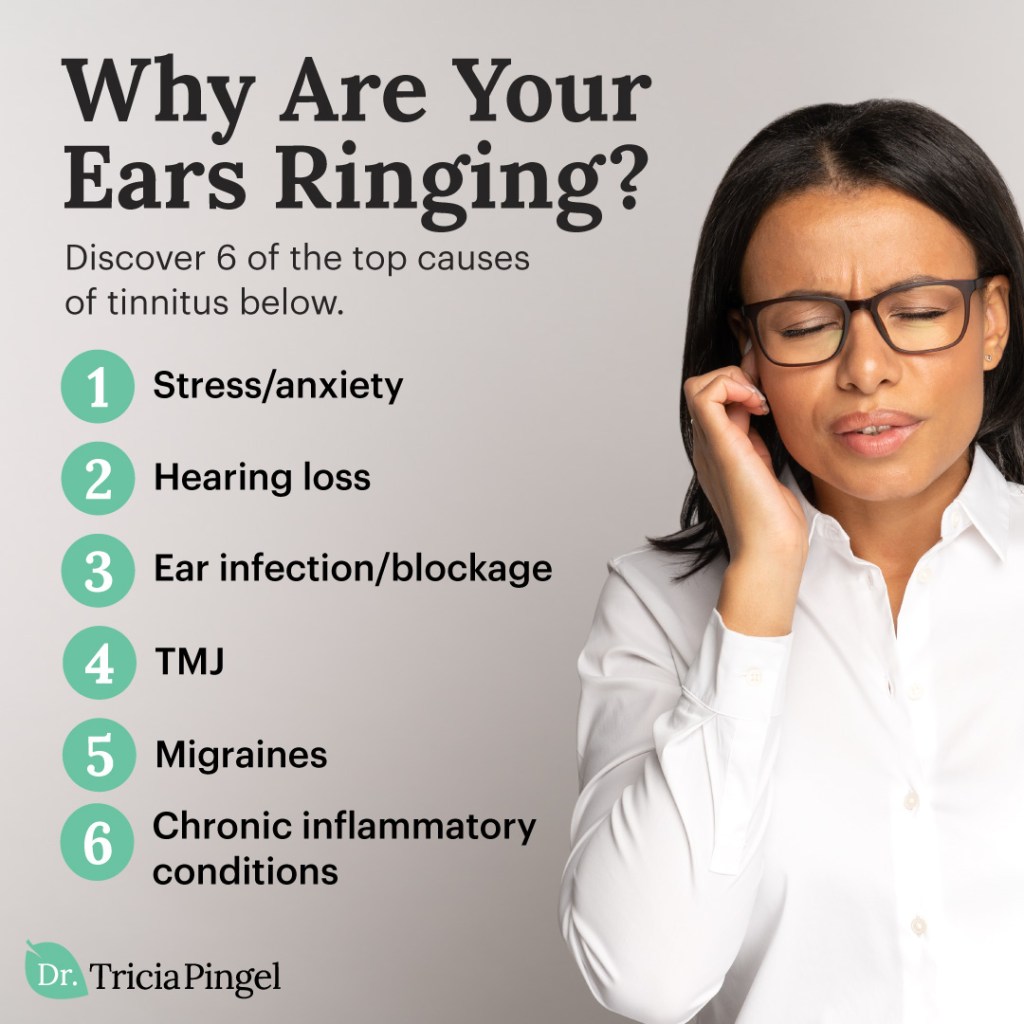Tinnitus (Constant Ringing in Ears): Causes & Remedies
Have you ever had that annoying, non-stop ringing in your ears? If so, you’ve experienced tinnitus! But what causes it and, more importantly, what can you do to make it stop—fast?
Let’s discuss this all-too-common nuisance, the top causes, and some effective natural remedies!
What is Tinnitus?
Simply put, tinnitus is any internally produced sound in your ears, such as ringing, buzzing, roaring, clicking, etc. While it usually occurs in one ear at the time, it can occur in both simultaneously.
It can occur at different pitches but the most common pitch is high.
Tinnitus is pretty common, impacting about 10 percent of American adults, which is roughly 25 million people, each year. [1] And about 16 million people seek treatment for it annually.
Now that you know more about what, exactly, tinnitus is as well as how common it is, let’s look at some of the most common causes.
Why Are Your Ears Ringing?
Discover 6 of the top causes of tinnitus below.
1. Stress/anxiety
Believe it or not, one of the single most common causes of tinnitus that I see on a regular basis is stress and/or anxiety.
Here’s how stress and anxiety cause it: When you encounter stress, your fight-or-flight system kicks on. The result? Increased blood flow and nerve pressure, which also impacts your inner ear, leading to tinnitus.
Interestingly, researchers have confirmed this link. According to a 2018 cross-sectional study aptly titled “Tinnitus: The Sound of Stress?,” researchers followed 180 people with chronic, subjective tinnitus.
They found that of the 180 participants, 65 percent reported experiencing symptoms of stress! [2] That’s quite a strong link!
While we can’t effectively eliminate stress from our lives, but we can support our body’s ability to manage it, thereby reducing its impact.
If you’re experiencing tinnitus and other symptoms of chronic stress, I want to invite you to check out my 30-day program, which is designed to help you support your body’s ability to manage stress and improve your overall health and well-being.
There’s no reason you have to deal with the effects of stress for one more day!
2. Hearing loss
Another common cause of tinnitus is hearing loss. In fact, hearing a ringing in your ears is one of the most commonly reported symptoms of hearing loss.
Basically, your brain is overcompensating due to a lack of input from your ear. [3]
The lack of activity (sound) traveling from the ear to the central nervous system in your brain causes increased nerve activity, which results in tinnitus.
So, how often is tinnitus linked back to hearing loss? Research has shown there’s quite a strong link, with approximately 90 percent of those with tinnitus experiencing hearing loss. [4]
If you think you may have hearing loss, it’s best to get your hearing checked by an audiologist.
3. Ear infection/blockage
Both infections of the outer ear (commonly known as swimmer’s ear, or otitis externa) and inner ear (a middle ear infection, or otitis media, which commonly impacts children) can cause tinnitus.
Basically both types of infections cause inflammation and fluid accumulation, which can damage your eardrum, resulting in tinnitus.
If you suspect you have an ear infection, schedule an appointment with your doctor to get an official diagnosis.
4. TMJ dysfunction
TMJ (temporomandibular joint) dysfunction is damage to the joint at the sides of your mouth that allow for appropriate chewing. Oftentimes, people who have TMJ dysfunction have an inflamed joint.
Some of the common symptoms include grinding your teeth, a clicking sound when you open your jaw, and tinnitus. Here’s why: When this joint is inflamed, it can press on the eardrum, causing a phantom ringing sound.
TMJ dysfunction is often diagnosed by a dentist, and solutions range from a night guard (to prevent teeth grinding) to diet changes to TMJ massage or exercises.
5. Migraines
According to the American Migraine Foundation, certain migraines can cause tinnitus, noting that some migraine sufferers only experience tinnitus during a migraine attack. [5]
In fact, a meta-analysis on over 12,000 people revealed that migraine sufferers are more than twice as likely to experience tinnitus compared to people who don’t get migraines. [6]
If you suspect that a propensity for migraines could be causing your tinnitus, check out my article on migraine remedies.
6. Chronic inflammatory conditions
Finally, chronic inflammation has been linked to an increased likelihood of developing tinnitus.
According to research, elevated inflammation markers, specifically tumor necrosis factor alpha (TNF-α) and calpain signaling pathways.
Researchers found that when these markers are lower, patients received therapeutic effects on tinnitus. [7]
In terms of a solution, I recommend cutting out all highly inflammatory foods from your diet. These include gluten, dairy, sugar, eggs, red meat, and peanuts.
You can slowly integrate these foods back into your diet and see if any trigger your migraine symptoms to identify the cause.

When to Call Your Doctor
There’s a certain type of tinnitus known as pulsatile tinnitus that falls into a slightly different, more urgent category.
Pulsatile tinnitus is pretty rare andd sounds like a rhythmic pulsing or “whooshing” in your ear, often in time with your heartbeat.
The problem with pulsatile tinnitus is that it’s often caused by blood flow issues within your head and/or neck. As a result, if you’re experiencing this type of tinnitus, it’s advised that you see a doctor as soon as possible to rule out a more serious diagnosis.
Key Takeaways
- Tinnitus is any internally produced sound in your ears, such as ringing, buzzing, roaring, clicking, etc. While it usually occurs in one ear at the time, it can occur in both simultaneously.
- Top causes of tinnitus include: stress, hearing loss, ear infections, TMJ dysfunction, migraines, and inflammation.
- Try some of the natural remedies listed above, but if you experience pulsatile tinnitus, contact your doctor as soon as possible for an assessment.